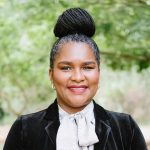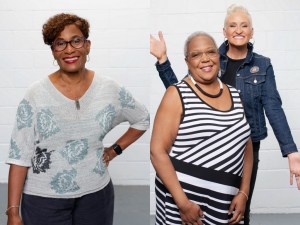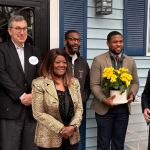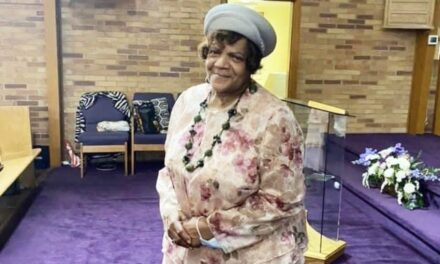Trinita Ashford has always been interested in working in health care. In fact, her early aspirations involved wanting to work as a nurse. (PROVIDED)
” data-medium-file=”https://www.birminghamtimes.com/wp-content/uploads/2023/10/TrinitaAshford-300×194.jpg” data-large-file=”https://www.birminghamtimes.com/wp-content/uploads/2023/10/TrinitaAshford.jpg” />
By Keisa Sharpe-Jefferson
The Birmingham Times
Trinita Ashford knows about balance. The mother of seven has served as executive director of ConnectionHealth, a community-based organization that has recruited, trained, employed and deployed community health workers (CHWs) since 2021.
CHW is just a fancy term for what people do naturally, said Ashford: “A lot of people are CHWs, and they don’t even realize it.”
“You may have a neighbor that is always trying to help the neighbor next door with resources—it could be that neighbor that needs help getting transportation, getting to the hospital, or getting to a clinical appointment. … That’s something a CHW would do,” she explained.
CHWs play a pivotal role in improving health outcomes “by bridging the gaps in health care access and promoting health literacy within underserved communities,” Ashford said. “They [have a] unique ability to establish trust, provide culturally sensitive care, and navigate social determinants of health, contributing to reducing health disparities—and that is a big thing in our communities.”
At ConnectionHealth, located on Magnolia Avenue on Birmingham’s Southside, Ashford manages a staff of more than 20, in addition to contract workers. The organization, which has so far trained 185 CHWs, has partnerships with the Jefferson County Department of Health (JCDH) and the University of Alabama at Birmingham (UAB).
And, recently, ConnectionHealth was awarded a $3 million Alabama Community Health Worker Institute for Education, Vocational Training, and Engagement (ACHIEVE) grant from the U.S. Department of Health and Human Services to expand its training program, allowing the organization to equip more CHWs for service.
A Skillful Juggling Act
While Ashford, 51, manages the demanding role as an executive director in the ever-evolving medical industry, she also balances the roles of motherhood and marriage. She has seven children: two sets of twins—24-year-old daughters, both pursuing medical careers, and 13-year-old boys—two other daughters, ages 29 and 18, and a 16-year-old son.
While parenting seven kids is certainly a “monumental task with lots of prayer, I find the strength, guidance, and patience needed to nurture each child individually,” she said. “Prayer keeps me grounded and provides a source of comfort and hope in challenging times.”
The medical industry has deep roots in her life and her family, as she is married to an obstetrician, Rowell S. Ashford II, M.D., whose father was also an obstetrician. The couple recently celebrated their 25th wedding anniversary on September 5, and, although the couple hadn’t planned anything yet to celebrate, Ashford said they’re “working on something special.”
Ashford has always been interested in working in health care. In fact, her early aspirations involved wanting to work as a nurse, but “that changed after I took a class at UAB,” she recalled. “I was taking a class that looked at the Foundation to Health Education and the instructor talked about preventative care. That sounded more appealing to me.”
And so, it began.
Diverse Education and Travel
Ashford, a Birmingham native, graduated from Ensley High School in 1989. She then attended the University of Maryland and studied abroad, in Munich, Germany, for her first two years of college. A potential career in modeling, plus a desire to know her birth mom, who was a nurse in the U.S. Army, led her to study overseas. “I knew my mother, but my dad raised me,” said Ashford.
For her third year of college, she transferred to UAB and did her first internship at the Maternal, Child, and Adolescent Health Division at the Watts Health Department in Los Angeles, California, an opportunity that was arranged by her aunt. After the internship, Ashford returned to Birmingham and earned a bachelor’s degree in health education in 1994 and a Master of Public Health (M.P.H.) degree in 1998.
Then, Ashford sought a career change and obtained both a real estate license and a broker’s license. Currently, she is an associate broker at ARC Realty.
“I’ve always been interested in real estate. I’ve been interested in investing,” she said. “A friend and I decided we would do it together, and we’ve been partners for 15 years.”
While she still works in the real estate industry, Ashford has returned to health care. Since 2021, she has been in her position at ConnectionHealth, where she works on several projects, including promoting the role of CHWs.
“They are receiving training in cultural competencies, public health knowledge, stress management, and burnout prevention, [in addition to developing] communications, advocacy, and interpersonal skills [and learning] better ways to navigate the health care system,” said Ashford. “We do a whole module on self-care, [as well as teach] outreach strategies. Through their training, they do a lot of role-playing.”
Ashford pointed out a number of important programs, including From Day One (FDO), which assigns CHWs to pregnant women from the first trimester through the baby’s first year of life. “Those CHWs can come in contact with all kinds of different things that can be going on with the pregnant woman,” she said.
Where It All Began
The health executive never forgets her roots: “I grew up in Ensley in a middle-class family,” said Ashford.
“My dad worked at U.S. Pipe in Bessemer,” she continued. “My dad only had a high school education, and he has two daughters. When I got my master’s degree, he was so excited. You would have thought I won some money.”
Even though it can be a challenge to juggle her myriad family and career demands, Ashford finds time for herself and plans to double down on that effort in the near future.
“My favorite thing to do is get on my Peloton and work out,” she said. “I also like working out in groups, and I intend to get my membership back at Lifetime Fitness. It was so much fun. I would easily go four times a week before [the COVID-19 pandemic].”
When it comes to balancing it all, there is no formula, said Ashford: “I just do it! I don’t think there’s a perfect way to do it. I think it’s just what women do in general.”
And it’s not just about checking the boxes on her resume. There is a greater reward in the work she’s doing at ConnectionHealth, she said.
“Being back in the public health space, the work that we’re doing, the lives that we’re impacting means a lot to me personally, especially working in vulnerable populations and underserved communities,” said Ashford.
To learn more about ConnectionHealth or to partner with them in their work in the community, visit www.connectionhealth.org.











